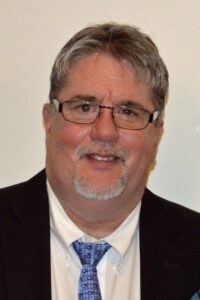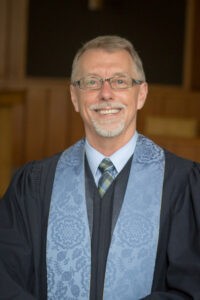Nearing its 30-year anniversary, a small-but-determined Baptist organization in Canada continues its struggle for religious and congregational freedom in the shadow of an increasingly conservative denominational movement that demands submission to scriptural and theological uniformity, its leaders say.
The Gathering of Baptists has riled fundamentalists for decades by embracing clergy and churches that have backed fired seminary professors, become welcoming and affirming of LGBTQ persons, supported women in ministry and refused to endorse credal statements seeking lockstep conformity on matters such as the biblical definition of marriage.
But the group’s founding in 1993 and its continuing evolution and mission ever since have been less about taking stands on those issues and more about protecting the right of congregations, clergy and laypeople to do so if they wish, said Blake Eady, pastor of Selkirk Baptist Church in Ontario, Canada, and moderator of The Gathering.

Blake Eady
In other words, Eady said, the community’s focus is largely on the distinctives of Baptist faith, including freedom of individuals to interpret Scripture and the autonomy of individual churches.
It means the fellowship is a collection of people and congregations who may sometimes see eye-to-eye on little else than those and other religious freedoms, he said. “We are welcoming and affirming of people who don’t always agree with us.”
The need for the group emerged about 40 years ago when a movement for biblical literalism and institutional conformity arose within what is now the Canadian Baptists of Ontario and Quebec, said Gary Caldwell, secretary and treasurer of The Gathering. He noted the similarity of the situation Baptists confronted in Canada in those days to those in U.S. faced with the conservative takeover of the Southern Baptist Convention. “Like everybody else in the world, we were experiencing a shift to religious conservativism by the late ’80s.”
By the early 1990s, that shift resulted in the terminations and forced resignations of professors at McMaster Divinity College in Hamilton, Ontario, for challenging the biblical literalism and effort at top-down control more openly sweeping through the denomination at the time. As some congregations rallied to support the beleaguered scholars, conversations began to percolate among disenchanted clergy about possible next steps.
“A few got together to ask about what it is to be Baptist, to ask about the Baptist distinctives and about Baptist freedoms,” said Caldwell, the pastor of one of the three congregations with the ex-professors as members.
Eventually a document, “This We Believe,” was introduced outlining the denomination’s conservative stance on God, church and faith. “It was pretty narrow. It did not include the Baptist freedoms,” Caldwell said. “There was a lot of fundamentalism in ‘This We Believe.’”
The document functions more like a profession of faith than pledge of loyalty like the SBC’s Baptist Faith and Message, said Dave Ogilvie, pastor of Burlington Baptist Church in Burlington, Ontario.
This became another motivating factor among Baptists committed to religious freedoms.

Dave Ogilvie
“It’s a document adopted originally by the denomination in the ’90s as an educational resource for use in churches,” he continued. “However, more recently there has been a move to make it binding on churches, and therefore as a potential means of removing churches that step out of line — most specifically if they become welcoming and affirming of LGBTQ members.”
Eventually, the conversation about the threat to historic Baptist identity began to widen. Eady said he was incensed when his mentor, a McMaster faculty member, was let go. “I connected over the treatment of professors and the fact that Baptist freedoms were just being stomped all over the place.”
From there, the movement continued to gel, according the group’s official history. “A number of voices began to cry out in their wildernesses for our people of BCOQ (Baptist Convention of Canada and Quebec) to take heed of our Baptist traditions and scriptural inspirations for free, informed thought and just action, and to warm the chill winds so as to foster wholeness and integrity following the example of Jesus.”
By October 1993, the efforts of three independent groups coalesced into a series of meetings of what would become The Gathering. It started as a group of individuals that later included congregations.
The founding came just in time for the national debate that arose in Canada around same-sex marriage. Conservative Baptists were inspired to try to squelch its acceptance among denominational churches, leading to dissension from those who believed it should be up to individuals and congregations.
The founding came just in time for the national debate that arose in Canada around same-sex marriage.
“The (Canadian) Supreme Court was discussing whether or not to legalize same-sex marriage, which it eventually did in 2004,” Ogilvie said. “But in the years up to that there was a societal conversation which generated pushback from Baptists who had become very conservative in their thinking. As a result, The Gathering became a safe place for more creative conversation on the issue and a safe place for LGBTQ people to be.”
The Gathering today has both friends and opponents in the denomination, ranging from those who want its members and churches kicked out of CBOQ to those who disagree with the organization’s values but who also hold traditional Baptist views on congregational autonomy. “So, there’s a tension in the conversation right now,” Eady said.
Despite the controversy, few Gathering churches are fully welcoming and affirming and some hold dual memberships with that group and the more conservative denomination.
But even those who do openly welcome LGBTQ Christians do not have thriving ministries to those communities, Ogilvie said. “There aren’t a lot who identify as LGBTQ who are beating a path to our church doors” because churches are viewed with suspicion in Canada’s highly secular society. His congregation is among the few that are fully welcoming and affirming.
“We had a woman who drove by our church at least once a week seeing our welcoming and affirming sign. It took her two years to decide to muster courage to come through the doors to see if we really meant it, and was pleasantly surprised,” he explained. “Many of those who come to our church, if they know about Baptists, are surprised to learn about a Baptist church that is a welcoming and safe place for them.”
But it’s an uncomfortable situation for the church, which is being threatened with disenfranchisement by its regional association because of that sign, he said. “I don’t know of any Baptist churches that have been disfellowshipped. But we have been threatened with that at the association level, and sometimes we feel threatened around the convention level. But it hasn’t taken place yet.”
It didn’t help when Ogilvie delivered a biblical perspective on LGBTQ issues during the denomination’s assembly during the pandemic.
“There were some who were ready to tar and feather me and some who heard for the first time that there is an alternative biblical interpretation on these matters.”
“There were some who were ready to tar and feather me and some who heard for the first time that there is an alternative biblical interpretation on these matters,” he explained.
And there are other threats, including an ongoing move to strip Gathering clergy of their licenses to marry if they perform same-sex weddings, a move made possible by the way Canada works through denominations to distribute those licenses.
Getting around that “would force us into actually becoming a denomination” rather than a community that upholds historic Baptist freedoms, Caldwell said.
Eady said The Gathering is needed now more than ever. “Basically it’s ‘Baptist beliefs be damned’ in our denomination right now and they are pushing harder to take action, which is why they want Dave’s congregation booted.”
Related articles:
John MacArthur rallies pastors to preach against government bans on conversion therapy Jan. 16
For Zimbabwe’s Christian LGBTQ refugees, Montreal city is a sanctuary


